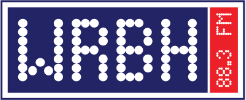Listeners:
Top listeners:
-
 play_arrow
play_arrow
WRBH 88.3 FM Reading Radio
- home Home
- keyboard_arrow_rightWho We Are
Who We Are

Mission
WRBH transforms the printed word into the spoken word, ensuring that the blind and print-impaired have the same access to information as their sighted peers.
History of WRBH
 WRBH 88.3 FM started with a bold idea from Dr. Robert McClean, a blind mathematician who believed that the blind and print-impaired should have the same access to information as their sighted peers. In the mid-1970s, Dr. McClean leased airtime from WWNO and began reading local newspapers over the radio. His vision expanded in 1982 when he purchased the 88.3 FM signal, establishing WRBH as the first full-time reading radio station on the FM dial in the United States. This groundbreaking step made information more accessible to thousands who had previously been isolated from the printed word.
WRBH 88.3 FM started with a bold idea from Dr. Robert McClean, a blind mathematician who believed that the blind and print-impaired should have the same access to information as their sighted peers. In the mid-1970s, Dr. McClean leased airtime from WWNO and began reading local newspapers over the radio. His vision expanded in 1982 when he purchased the 88.3 FM signal, establishing WRBH as the first full-time reading radio station on the FM dial in the United States. This groundbreaking step made information more accessible to thousands who had previously been isolated from the printed word.
In 1992, WRBH took a further step by purchasing its own space—a 19th-century Victorian building on New Orleans’ Magazine Street—which has housed both our recording studios and administrative offices ever since. The physical location became a hub for volunteers and staff working together to serve the community.
The year 2000 marked WRBH’s leap into the digital age with the launch of live streaming and podcasting, making our programming accessible to a global audience. Listeners who once relied solely on FM radio could now access WRBH content from anywhere in the world.
In 2014, WRBH joined forces with HEROfarm, a local marketing and design firm, to create a fully accessible website tailored for the blind and visually impaired. This collaboration made it easier for listeners to access our programming through screen readers and intuitive navigation. Ten years later, in 2024, we partnered with HEROfarm once again to relaunch an even more enhanced website. The updates focused on improving accessibility, expanding global reach, and ensuring that WRBH remains a trusted resource for the print-impaired community—delivering information and enrichment seamlessly to both long-time listeners and those discovering us for the first time.
Through all these milestones, WRBH has remained committed to Dr. McClean’s original vision—delivering high-quality programming that enriches the lives of the blind, print-impaired, and those who cannot access the printed word.
What We Do
 WRBH broadcasts a wide range of content 24/7, from local and national news to best-selling books, magazine articles, cooking shows, and grocery ads. Our programming also serves diverse communities, offering shows in Spanish, Haitian, and Vietnamese.
WRBH broadcasts a wide range of content 24/7, from local and national news to best-selling books, magazine articles, cooking shows, and grocery ads. Our programming also serves diverse communities, offering shows in Spanish, Haitian, and Vietnamese.
With the help of 150 volunteers donating 5,000 hours annually, WRBH keeps everyone informed—regardless of their ability to read. Whether it’s cultural enrichment, educational programming, or practical information, we make it accessible to all.
Our Listeners
We serve a broad audience, from the blind and print-impaired to individuals who’ve lost the ability to read due to illness, injury, or aging. Unlike automated services, WRBH uses human readers, providing a personal touch. This approach is especially valuable for those new to vision loss, who find human-read content easier to follow.
Our FM signal reaches a 90-mile radius across parts of Louisiana and Mississippi, while our streaming and podcasts connect us to listeners worldwide.
Community Impact and Partnerships
At WRBH, we believe in the power of community collaboration to amplify our impact. By partnering with local organizations that share our commitment to accessibility and enrichment, we extend our reach and enhance the services we provide. Here are some of the key partnerships that help us make a difference:
- Lighthouse Louisiana: Dedicated to serving the blind and visually impaired, Lighthouse Louisiana empowers individuals through quality products, services, and opportunities for independence. WRBH guest lectures at their classes twice a year refers listeners to their services, and supports their mission through public service announcements (PSAs).
- Blinded Veterans Association: Committed to promoting the welfare of blinded veterans, this association helps them integrate into the community and work towards a peaceful world. WRBH participates in its annual expo and broadcasts PSAs to support its initiatives.
- Entergy: Since 2009, we’ve partnered with Entergy to produce Going Green, a program that educates listeners on energy efficiency and sustainable practices. Entergy underwrites the show, and together we generate educational content that benefits the entire community.
- Young Leadership Council (YLC): In collaboration with YLC, we support the One Book One New Orleans campaign, a citywide literacy initiative that encourages residents to read the same book each fall. WRBH records and broadcasts the audiobook, read by YLC youth volunteers, fostering community through shared stories.
By working with these organizations, WRBH enhances the lives of those we serve, ensuring access to vital information, resources, and enrichment opportunities. Our collaborative efforts not only strengthen our programming but also deepen our connection to the community we proudly serve.
FCC Profile
https://publicfiles.fcc.gov/fm-profile/wrbh
Click here to help WRBH continue its service to the community!
About WRBH
WRBH 88.3 FM, Radio for the Blind and Print Handicapped, is a 501(c)(3) non-profit organization and is the only full-time reading service on the FM dial in the United States. At WRBH, our mission is to turn the printed word into the spoken word so that the blind and print handicapped receive the same ease of access to current information as their sighted peers.


